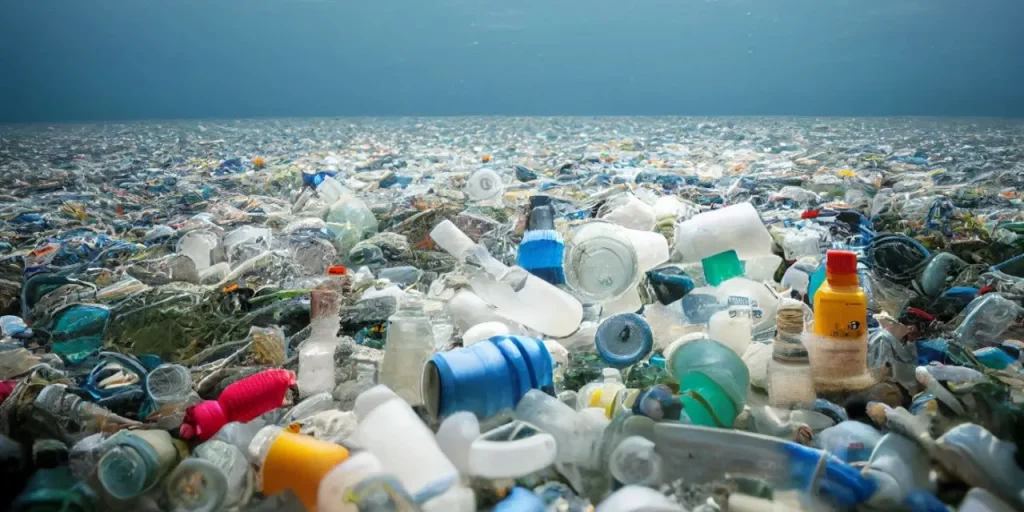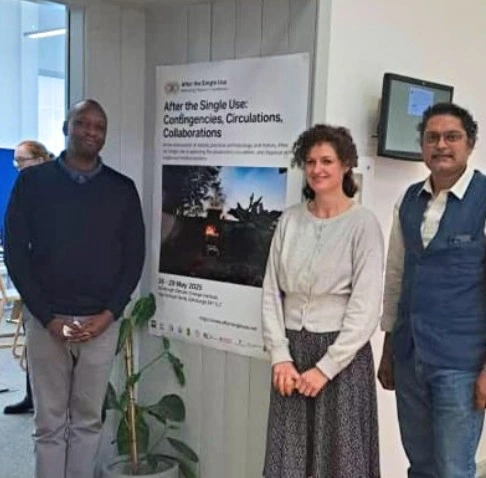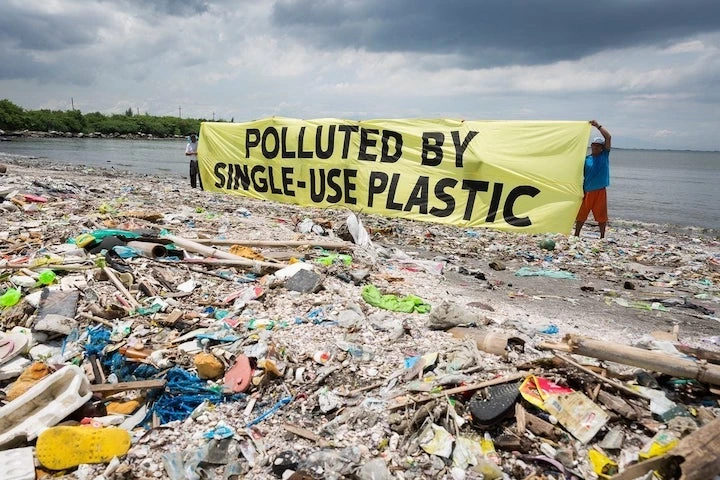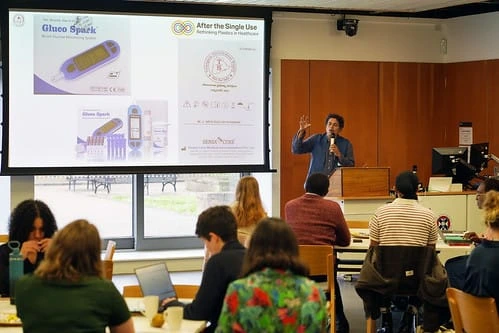(September 13, 2025) The University of Hyderabad (UoH) has stepped onto the global stage. Its Department of Anthropology has joined an ambitious international initiative, “After the Single Use,” to combat single-use plastics in healthcare. “The project will investigate diverse healthcare settings, from aid posts in Papua New Guinea to hospitals in the USA and India, studying global interconnections in healthcare waste, and local solutions to reduce reliance on single-use plastics,” Dr. Nanda Kishore Kannuri, Associate Professor at UoH tells Global Indian.
Technology and infrastructure may be propelling healthcare to unprecedented heights, but the very tools that save lives are silently damaging the planet. From IV fluid bags to syringes, pill packaging, and gowns, most medical items are single-use plastics. Their lifespan is measured in seconds or hours, yet their afterlife stretches across decades as they fragment into microplastics and nanoplastics—polluting oceans, poisoning soil, and worsening climate change.

First-of-its-kind international collaboration
“The project brings together anthropologists and historians from across eight countries to address the challenge of single-use plastics in health care, by employing innovative methods to analyse the life cycles of single-use plastics, and collaborate with stakeholders to develop sustainable healthcare solutions,” Dr. Kannuri explains.
The project’s inaugural workshop in Edinburgh marked a milestone. Researchers and partners convened to share ideas, define their objectives, and develop shared values for this unprecedented initiative.
Rethinking disposability
“After the Single Use” initiative aims to create an entirely new field of critical humanities, art, and social science research focused on medical plastics and circular healthcare economies. “The project runs with collaborative hubs in Edinburgh and partner institutions worldwide. We will explore how a culture of disposability became normalised in healthcare systems, and the environmental, social, and health impacts of single-use medical products,” notes Dr. Kannuri, who holds adjunct roles at IIT Hyderabad, the Indian Institute of Public Health–Shillong, and the University of Toronto, in addition to serving as a faculty member at the University of Hyderabad.

Prof Kannuri with Prof Alice Street, Principal Investigator of the project at the Edinburgh University, and Peter Mangesho from Tanzania
The team will employ ethnographic, archival, and arts-based methods. “We will analyse the life cycles of disposable medical technologies and their environmental and social consequences and collaborate with policymakers, activists, engineers, and designers to develop circular healthcare solutions,” Dr Kannuri mentions.
India’s role in a global endeavour
The UoH has already set the wheels in motion by signing the Collaboratory Agreement on August 19. One of Dr. Kannuri’s PhD scholars, Akhilesh Bonthu, is pioneering research on ‘Medical Imaging: From Manufacture to Discard through an Anthropological Lens’. Researchers will trace how disposable medical devices are produced, transported, consumed, and discarded, mapping the relationships they create across people, places, and economies.
“The project will also focus on the local circular economies of the single-use plastics in health care by following the object’s approach to understand repair, recycle, and reuse,” says Dr. Kannuri, whose 23 years of professional experience span social development and academia.
The numbers tell the story
The scale of the problem is staggering. Single-use plastics contain a mix of more than 16,000 chemicals, 4,200 of which are already known to harm human and environmental health. During the COVID-19 pandemic, a record amount of personal protective equipment (PPE)—such as face masks, gloves, goggles, and gowns—was used. It is estimated that over 129 billion face masks and 65 billion gloves were used globally each month during the pandemic.

Photo Credit: The CSR Journal
The US healthcare sector alone generates 1.7 million tons of plastic pollution every year, and an estimated 20 to 25 percent of the more than 14,000 tons of trash that hospitals worldwide produce each day is plastic. Back home in India—home to nearly 4.35 lakh healthcare facilities, thousands of which are small clinics or non-bedded centres—monitoring this waste stream remains a huge challenge. According to one estimate, India generates about 743 tonnes of biomedical waste every day, with plastics forming a significant share.
Single-use items drive environmental pollution by generating carbon emissions during manufacture, transportation, and disposal, thereby worsening climate change. Their health impacts are equally troubling: microplastics introduce toxins into the body, contributing to hormonal imbalances, cancer, and other as-yet-unknown risks.
Dr Nanda Kishore Kannuri, Associate Professor at UoH
Dr. Kannuri notes that the healthcare sector is estimated to contribute about five percent of global carbon emissions. “The COP28 Declaration on Climate and Health stressed the need to curb emissions and reduce the health sector’s waste as a key priority,” he adds.
Backed by global partners
The “After the Single Use” project is funded by the London-based Wellcome Trust under its Discovery Awards Scheme and has been awarded to the lead principal investigator, Prof. Alice Street, of the Department of Anthropology, University of Edinburgh, UK. “The grant allocated for research in India amounts to £402,906 (approximately INR 4,75,65,309) for a five-year duration,” informs Dr Kannuri.
Apart from the Department of Anthropology, School of Social Sciences, UoH, the global team of collaborators comprise experts from the University of New South Wales (Australia), University of Geneva (Switzerland), University of Oslo (Norway), National Institute of Medical Research (Tanzania), CRCF (Senegal), PNG Institute of Medical Research (Papua New Guinea), Johns Hopkins University (USA).
Health Care Without Harm (HCWH) and the Norwegian BioartArena (NOBA) are the key NGO partners involved in this project. “HCWH aims to transform healthcare worldwide so that it reduces its environmental impact, becomes a community anchor for sustainability, and a leader in the global movement for environmental health and justice, says Dr Kannuri. HCWH India has been working on this issue currently in collaboration with the Public Health Foundation of India, focusing on health care sustainability and Global Action.
“NOBA will collaborate with us to establish ‘After the Single Use’ art residencies, integrating art research, practice, and public engagement into the ASU project,” says Dr. Kannuri. “The initiative aims to produce monographs, policy briefs, and research articles in peer-reviewed journals over the course of the project.”

Dr. Nanda Kishore Kannuri in a session with the international researchers of the project
Frontline perspectives
Dr Srikrishna R Boddu, Consultant General Physician at Kamineni Hospitals in Hyderabad says single-use plastics have become synonymous with safety and efficiency. Items like disposable syringes, gloves, IV sets and sample containers are vital in infection control, especially in high-volume outpatient clinics and mobile health camps.
“For many rural practitioners, these tools have enabled accessible care with minimal infrastructure. Yet, the environmental consequences are becoming harder to ignore. Medical waste often ends up in open dumps or is incinerated without segregation, posing risks to sanitation workers and surrounding communities,” he says, pointing out that the Telangana government has taken proactive steps like banning certain single-use items and implementing the plastic waste management rules through the state pollution control board.
Encouragingly, regional healthcare institutions are beginning to explore alternatives. “Some clinics are piloting reusable diagnostic kits, while others are partnering with NGOs for waste segregation and compostable packaging,” he says.
He says values of thrift and reuse offer fertile ground for circular healthcare models. “The UoH’s participation in the global project adds momentum to this shift. By combining ethnographic research with policy and design, various states can pioneer context-sensitive solutions that balance hygiene, affordability and environmental stewardship,” feels Dr Srikrishna. “In essence, the future of healthcare in India and Telangana in particular, lies not in abandoning plastics but in reimagining their lifecycle — grounded in local realities and guided by global collaboration,” he adds.
By joining this eight-nation effort, the University of Hyderabad places itself, along with Telangana and India at the heart of a worldwide push to reinvent the life cycle of healthcare plastics.
ALSO READ: How technology, expertise, and affordability are driving a surge in medical tourism in India



